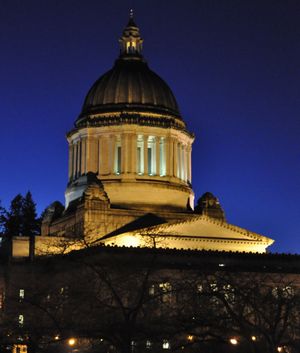Bills falling by the wayside after Washington Legislature’s cutoff
OLYMPIA – Washington will not be dropping the death penalty this year. It will not become a “right-to-work” state.
The Legislature will not be asking Congress and President Donald Trump to split the state along the Cascade Crest and form the new state of Liberty out of the eastern half.
It won’t be changing laws to require people to use a public restroom or other public facility based on their biology at birth, rather than their gender identity. It won’t be restricting state money for abortions to only medically necessary procedures.
Bills on all of these topics, which drew interest from some parts of the state and heated debate from others, all failed to meet a key deadline Friday: A legislative rule required a bill seeking to change state policy to receive support from the majority of its first committee by 5 p.m. Friday.
Some proposals never got a hearing. Among them was the proposal to split Washington and create a 51st state. Technically, this was just a resolution asking the Congress and president to do the splitting, but resolutions, like bills, are subject to that deadline, called a cutoff.
It’s a way to winnow down the hundreds of bills introduced in each chamber so lawmakers can focus their attention in the coming months. While it’s possible to resurrect a bill that doesn’t make the cutoff, that does require some parliamentary maneuvering.
After a big roll-out that included support by Gov. Jay Inslee and Attorney General Bob Ferguson, a bill to end capital punishment in Washington and replace it with life in prison without parole got a hearing in a House committee. But it didn’t get a vote. The Senate version of the bill didn’t get a hearing.
Two bills on public restroom use, sometimes called gender segregation proposals, were introduced early but didn’t get hearings.
A proposal to restrict state funding for abortions, an idea that is introduced most years, did not get voted out of the Senate Law and Justice Committee. Another bill on abortion, which would require parental notification in most instances for a minor seeking an abortion, was sent out of that committee to the full Senate on a party-line vote.
A Senate proposal that said workers can’t be forced to pay union dues as a condition of employment – which business groups call “right to work” and unions call “right to work for less” – drew a large crowd of opponents from organized labor to its hearing, but did not get voted out of the Commerce, Labor and Sports Committee.
That panel did, however, send to the full Senate several other bills watched closely by business groups and organized labor, including proposals to create a wage for teens below the state’s minimum wage law, and to limit the recently approved initiative boosting the minimum wage to King County for several years, and another that would exempt nonprofit organizations from paying that wage.
The committee also approved a bill urging state support for bringing the Sonics back to Seattle. It’s hard to tell what that might entail because it’s what’s known as a title-only bill, which means it’s essentially blank and would need to have language put into it before being debated by the full Senate. It’s a way to keep an idea alive in hopes that some agreement can be reached.
Motorcycle riders who want the option to ride without helmets have a shot at an issue that surfaces most years in the Legislature. A bill allowing adults to do that was approved by the State Transportation Committee. A similar bill didn’t get a hearing in the House, so it could be a bumpier ride over there if the full Senate gives it an OK.
Some other bills that are being followed closely in Spokane also remain alive:
- Legislation that would help Spokane’s efforts to get a handle on hundreds of foreclosed properties passed the House Judiciary Committee this week.
- A bill to extend a tax break for motion pictures shot in Washington passed a Senate committee. But because it makes changes to taxes, it must also pass the Senate Ways and Means Committee. Cutoff for bills that make changes in taxes or the budget must get that second committee approval by next Friday.

